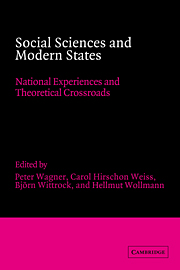16 - Summing up: social sciences and modern states
Published online by Cambridge University Press: 05 February 2012
Summary
It is time to review the Lasswellian vision for the policy sciences in light of the collective wisdom of these chapters. As we noted at the outset, the early proponents of the policy sciences had a grand scheme in mind. They called for: focus on world-critical issues of democracy; interdisciplinary investigation; value-based choice of the problems to study but valueneutral conduct of investigation; sensitivity to institutions, societies, and individuals; improvement in the knowledge basis of advice to policy makers along with simultaneous development of the policy sciences as sciences; development of institutions to bring researchers and policy makers into contact.
The agenda still sounds relevant. However, as the contributors to this volume have revealed, some elements of the policy-science agenda are harder to bring to fruition than others. In a number of the countries represented in these pages, only some steps have been taken. In others, there have been advances on some attributes or in some social sciences, but occasional declines as well. The cutbacks in social-science research funding in the 1980s are one indicator of a general decline in optimism about the contributions that policy science can make. Another shift in recent years, even in nations where the call for policy sciences was most heeded, is the reduced emphasis on their scientific status and the heightened attention to their qualitative and humanistic dimensions.
- Type
- Chapter
- Information
- Social Sciences and Modern StatesNational Experiences and Theoretical Crossroads, pp. 356 - 368Publisher: Cambridge University PressPrint publication year: 1991
- 6
- Cited by

